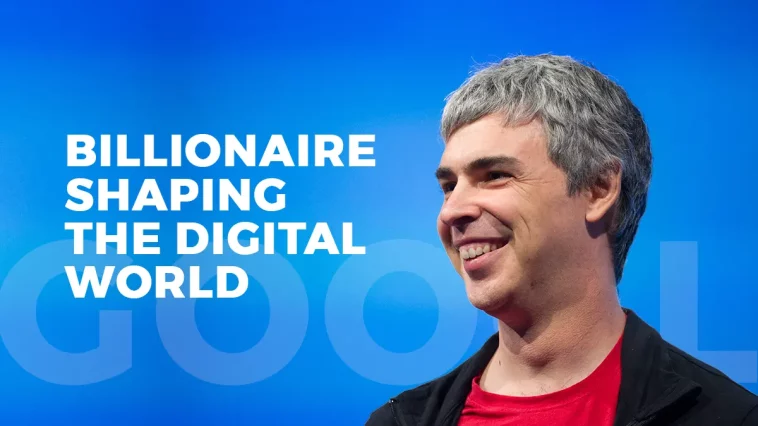Larry Page, a name synonymous with innovation and entrepreneurship, is not only a tech visionary but also a billionaire with a profound impact on the digital landscape. Co-founder of Google and later instrumental in establishing Alphabet Inc., Page’s journey from a brilliant computer science student to a billionaire leader is nothing short of remarkable. In this article, we explore the life, achievements, and the billionaire legacy of Larry Page.
Early Years and Education:
Larry Page was born on March 26, 1973, in East Lansing, Michigan. From an early age, he displayed an innate curiosity and passion for technology. This interest was significantly influenced by his father, Carl Victor Page Sr., who was a computer science professor at Michigan State University.
Page’s academic journey took him to Stanford University, where he pursued a Bachelor of Science degree in computer engineering. His brilliance shone during his time at Stanford, where he embarked on a research project that would change the digital world forever.
Co-Founding Google:

In 1998, while pursuing his Ph.D. at Stanford, Larry Page, along with his fellow Ph.D. student Sergey Brin, co-founded Google. Initially conceived as a research project called “Backrub,” Google quickly evolved into a revolutionary search engine that prioritized relevance and precision in delivering search results.
The PageRank algorithm, developed by Larry Page himself, played a pivotal role in Google’s success. It ranked web pages based on the number and quality of links pointing to them, providing users with more accurate and reliable search results.
The Birth of Google:

“The Birth of Google” marks a pivotal chapter in the remarkable journey of Larry Page and Sergey Brin, two Stanford University Ph.D. students with a shared passion for technology and a vision to revolutionize the way people access information on the internet.
1. Backrub to Google: Larry Page and Sergey Brin initially embarked on their journey to create a groundbreaking search engine while pursuing their doctoral degrees. In 1996, they began working on a project called “Backrub.”
It was a research experiment that aimed to assess the importance of web pages based on their backlinks. This novel approach involved ranking web pages by the number and quality of links pointing to them.
2. The Name ‘Google’: As the project evolved, Larry and Sergey realized its potential and decided to take it to the next level. They rebranded their search engine as “Google,” a playful twist on the word “googol,” representing the mathematical term for the number 1 followed by 100 zeros.
This name encapsulated their aspiration to organize and make accessible an immense amount of information on the internet.
3. PageRank Algorithm: At the heart of Google’s success was the PageRank algorithm, developed by Larry Page. This algorithm assigned a numerical value, or PageRank, to each web page based on the number and quality of links pointing to it.

Pages with higher PageRank were considered more authoritative and were ranked higher in search results. This innovative approach delivered more relevant search results compared to other search engines of the time.
4. Breakthrough in Search Technology: Google’s PageRank algorithm was a breakthrough in search technology. It allowed users to find information more accurately and efficiently than ever before. Google’s clean and minimalist interface, combined with its speed and precision, quickly attracted users and set it apart from its competitors.
5. Early Challenges and Growth: Despite its promising start, Google faced numerous challenges, including competition from established search engines and the need for sustainable revenue. However, the company’s focus on user experience, relevancy, and a commitment to not compromise search results with paid advertising helped it gain the trust of users.
6. Funding and Expansion: Larry Page and Sergey Brin recognized the need for funding to support their rapidly growing venture. In 1998, they received their first investment of $100,000 from Andy Bechtolsheim, co-founder of Sun Microsystems. This marked the beginning of Google’s journey toward becoming a global tech giant.
7. Going Public: In 2004, Google went public with its Initial Public Offering (IPO), making Larry Page and Sergey Brin billionaires. This move allowed Google to secure the financial resources needed to expand its services and develop innovative products.
8. Google’s Ongoing Legacy: The birth of Google not only transformed the search engine landscape but also laid the foundation for numerous other digital services and technologies.
Google’s mission to organize the world’s information and make it universally accessible and useful continues to guide its innovations in various fields, from cloud computing and artificial intelligence to self-driving cars and healthcare.
“The Birth of Google” is a testament to the power of innovation, a compelling example of how two young visionaries with brilliant ideas can reshape the digital world and leave an enduring legacy that impacts billions of lives globally.
Billionaire Status:
With the rapid rise of Google, Larry Page’s financial status transformed dramatically. In 2004, Google went public with its Initial Public Offering (IPO), making Page and Brin instant billionaires. Their visionary approach to search and user-centric design had paid off handsomely.
Page’s billionaire status allowed him to invest in various ventures, from cutting-edge technology projects to philanthropic endeavors aimed at addressing global challenges.
Alphabet Inc. and Ongoing Ventures:
In 2015, Larry Page and Sergey Brin restructured Google, creating Alphabet Inc. as its parent company. This move allowed them to oversee a diversified portfolio of innovative ventures, from self-driving cars (Waymo) to healthcare technology (Verily).

Page’s continued involvement in Alphabet reflects his dedication to exploring new frontiers and pushing the boundaries of technology for the betterment of society.
Philanthropic Initiatives:
Page and his wife, Lucy Southworth, are known for their philanthropic efforts. They have supported numerous causes through their foundation, including educational programs and initiatives focused on addressing global challenges, such as clean energy and healthcare accessibility.
Conclusion:
Larry Page’s journey from a computer science enthusiast to a billionaire tech icon is a testament to his unwavering commitment to innovation, user-centric design, and the relentless pursuit of groundbreaking ideas.
His legacy extends far beyond his billionaire status, leaving an indelible mark on the digital world and inspiring countless individuals to dream big and strive for excellence in the realm of technology and entrepreneurship. Larry Page is not just a billionaire; he is a visionary who continues to shape the digital landscape and make a positive impact on our world.



Comments